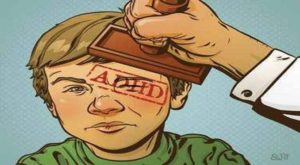It’s about time that someone else in the world began to tell this story besides us. ~ Ed
 THE legitimacy of Attention Deficit and Hyperactivity Disorder as a medical condition is questioned in a new report.
THE legitimacy of Attention Deficit and Hyperactivity Disorder as a medical condition is questioned in a new report.
The report, commissioned by the Youth Affairs Network of Queensland, has called for a moratorium on and inquiry into the use of the amphetamine-based drugs Ritalin and Dexamphetamine to treat ADHD diagnosed in thousands of Australian children.
Labelling the disorder a “questionable diagnosis”, the report, Queensland Children at Risk: The Overdiagnosis of ‘ADHD’ and the Overuse of Stimulant Medication, urges parents to abandon the drugs, originally used to treat psychiatric conditions such as narcolepsy and severe depression.
A recent study found prescription rates of ADHD drugs in Australia to be almost double that of the UK and higher than in the US.
Medical experts and ADHD support groups rejected the report’s findings and said many people would be adversely affected by a moratorium.
The report was highly critical of the 18 criteria used to assess children with ADHD and said only specialists should be allowed prescribe the medication.
The report author, psychologist Dr Bob Jacobs, said non-medical treatment of children with behavioural problems and learning difficulties, such as improved parenting and teaching techniques, was being ignored in favour of a “quick-fix pill”.
Dexamphetamine sulphate and Ritalin, or methylphenidate, are in the same family as the illicit methamphetamine, and have been used since the 1930s.
The network commissioned the report in response to a dramatic rise in prescription rates.
 “We want people to make an informed decision based on all the information, but currently they aren’t hearing the other side of the story,” director Siyavash Dootskhah said.
“We want people to make an informed decision based on all the information, but currently they aren’t hearing the other side of the story,” director Siyavash Dootskhah said.
“Professionals in many parts of the world have begun to question whether the ‘disorder’ really exists, or if it is just a label we give to children who are misbehaving.”
Commissioner for Children and Young People Robin Sullivan, a former deputy director-general of Education Queensland, supported the call for further research.
“I am concerned about the increasing number of children on ADHD medication and the uneven geographical distribution of those receiving it,” she said.
“There are several possible reasons, including the possibility that some doctors diagnose ADHD more readily than others.”
She said medicating children during their most sensitive years should only be done if all other options had been exhausted.
Queensland Health recently launched an internal forum to discuss funding further research into ADHD issues.
The Royal Australian and New Zealand College of Psychiatry’s Faculty of Child and Adolescent Psychiatry rejected the recommendations of the report.

Like me… Bored out of my Life in School.
Spokesman Dr Tony Cook said a large body of research showed medication was able to help control behaviour and that it did not carry serious health risks.
Royal Children’s Hospital child and adolescent psychiatrist Scott Harden said the questions raised in the report were valid, but flew in the face of established scientific knowledge.
“If used carefully and appropriately, they (drugs) are extremely safe and effective agents,” Dr Harden said. “A moratorium would cause significant hardship to a large number of people.”
Queensland Teachers Union vice-president Steve Ryan said teachers had mixed opinions on whether ADD and ADHD were real or imagined conditions.
But a moratorium on ADD medications could have “dire consequences” and if unruly student behaviour increased, “then obviously the stress on teachers would be quite clear”.
Written by Joel Dullroy for News.com, and published on DrKelley.net, September 1, 2002. Embedded links (if any) may no longer be active. (Ed. 12.31.10)
FAIR USE NOTICE: This site contains copyrighted material the use of which has not always been specifically authorized by the copyright owner. We are making such material available in our efforts to advance understanding of environmental, political, human rights, economic, democracy, scientific, and social justice issues, etc. We believe this constitutes a ‘fair use’ of any such copyrighted material as provided for in section 107 of the US Copyright Law. In accordance with Title 17 U.S.C. Section 107, the material on this site is distributed without profit to those who have expressed a prior interest in receiving the included information for research and educational purposes. For more information go to: http://www.law.cornell.edu/uscode/17/107.shtml
